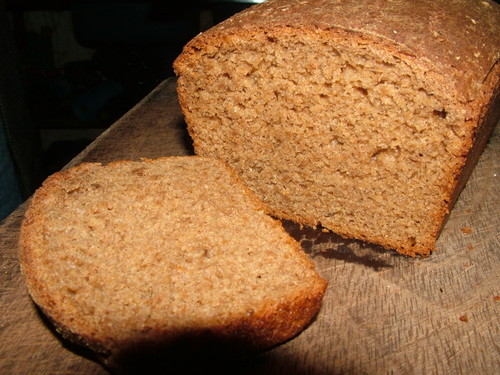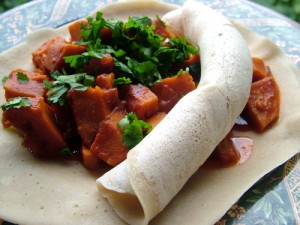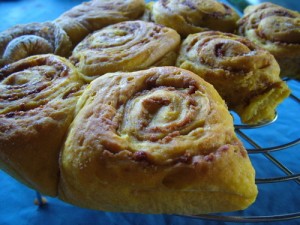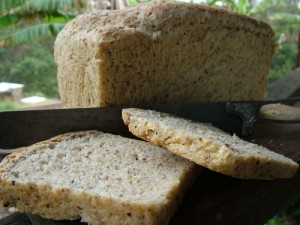I have a new favourite bread. This one is sooo good I’ve made it half a dozen times over now. My last favourite was Seedy Sourdough Crispbread, and it’s still up there – I’ve been making a batch most weekends – but this dense, malty, well-textured, chocolatey rye bread is totally addictive.
The Recipe:
The method is the same as the one I use for my Oat and Linseed Sourdough and Barley Bread. I’ve tried a lot of different timings, but this works so well around a workday that making bread routinely doesn’t feel at all like a chore.
Before I go to bed:
- Take the sourdough starter out of the fridge.
- Mix 1 ¼ cups of unbleached bakers flour, 1¼ cups of water, and 1¼ cups of starter. (I use my tank water, which has no chlorine or additives in it).
- Put half of it back in the jar in the fridge. You should be left with 1½ cups of fed starter, to put in a bowl covered with a clean cloth on the kitchen bench for the night. By morning it should be frothy.
Next morning:
Mix into the 1½ cups of fed starter:
- 2 dessertspoons (1½ US tablespoons) treacle
- 2 dessertspoons (1½ US tablespoons) macadamia (or other nut) oil
- 1 big dessertspoon (¾ US tablespoon) cocoa powder
- ½ teaspoon salt
- 1 teaspoon caraway seeds
- 2 cups organic wholemeal rye flour
- ½ cup wholemeal wheat flour
Pour another ½ cup wholemeal wheat flour on the bench and knead the dough briefly, until it is smooth and springy. I am time-poor enough that I just don’t do long kneading, but I’m learning to re-vision kneading as my regular tuck-shop lady arms avoidance exercise, so I actually like a bit of bread dough bashing.
Put a good dollop of macadamia (or other nut) oil in a large bowl, swirl the dough ball around in it to coat, cover the bowl with a clean cloth, and leave out on the benchtop for the day to prove. On cold days, I try to find a warm spot for it.
When I get home at 5.30
The dough doesn’t rise as much as wheat bread, but it will still rise to double the size it was when I left. I tip it out onto the benchtop (it’s already oily so no need to flour) and knead very briefly – a minute or so – then put it in a oiled baking tin. The tin I use is a small bread tin. Slash the top with a sharp knife, cover with the clean cloth again and leave again.
At 7.30
The bread will have doubled in size again. I’ve baked it a few different ways. It’s nicest without a crusty crust. The best result was in my slow combustion wood oven, with a tray of boiling water in the bottom of the oven, baked for around 30 minutes. The oven was well and truly heated up, but slow combustions have a very even, mellow heat. I’ve also baked it in the gas oven, putting it into a cold oven turned to high, and baking for around 40 minutes, with a tray of boiling water added about half way through.
It is done when it feels firm and sounds hollow when tapped.
PS. I baked it again this weekend, but away from home, and discovered that in a fan-forced electric oven, it needs to be cooked at a medium low temperature. I set it too high, and the middle was still doughy when the crust was getting too crisp.
[relatedPosts]




thank you for explaining the schedule, I’m still struggling to work out the best timing, but I haven’t bought any shop bread for 6 weeks, so that is a start!
A truly beautiful loaf. It looks quite light for a bread with so much whole rye. What brand of rye flour do you use?
Hi Liz, I get it from Bambu, my local wholefoods shop. I think it is Kialla.